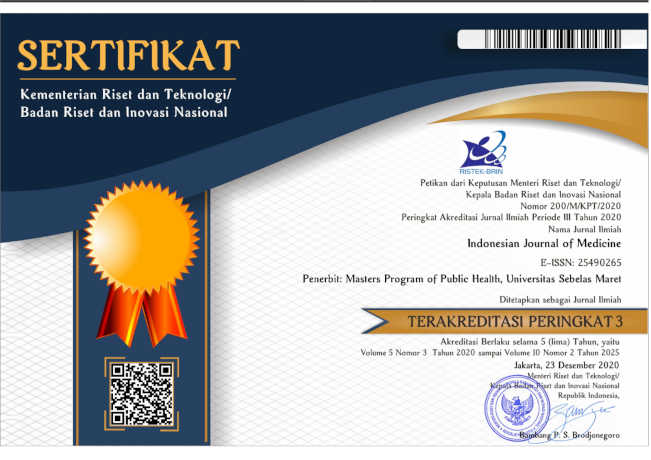The Effect of Holistic Programs on Cortisol Serum Levels in Polycistic Ovarium Syndrome
DOI:
https://doi.org/10.26911/theijmed.2019.4.4.240Abstract
Background: The increasing prevalence of polycystic ovary syndrome (PCOS) in Indonesia reaches 8-10%. Patients with polycystic ovary syndrome are at risk of experiencing complex psychological disorders and decreased well-being. Psychological disorders in polycystic ovary syndrome are at risk of developing physical symptoms and increasing insulin resistance. The Holistic Program consists of a combination of diet yoga and remembrance therapy as an integrated holistic therapy. There is no non-pharmacological therapy that is holistically integrated to reduce serum cortisol levels in polycystic ovary syndrome. This study aimed to examine the effect of holistic programs on cortisol serum levels in polycistic ovarium syndrome.
Subjects and Method: This was a randomized controlled trials conducted in Yogyakarta. A sample of 30 women patients with PCOS aged 19-40 years old was selected for this study. The sample was divided into 2 groups. The intervention group received holistic program for 14 days. The dependent variable was cortisol serum. The independent variable was holistic program. Cortisol serum and insulin levels were measure by ELISA method at the Integrated Research and Testing Laboratory, Universitas Gadjah Mada, Yogyakarta. Insulin resistance was calculated using the HOMA IR method. The data were analyzed by independent t-test and different test Paired t-test
Results: Serum cortisol levels in the intervention group were lower than the control group. Serum cortisol levels decrease after the implementation of a holistic program.
Conclusion: The holistic program that was carried out for 14 days in polycystic ovary syndrome is effective to reduce serum cortisol levels.
Keywords: holistic program, cortisol serum, polycystic ovary syndrome
Correspondence: Erna Yovi Kurniawati. Masters Program in Applied Midwifery, School of Health Polytechnics, Ministry of Health Semarang. Jl. Tirto Agung, Pedalangan, Banyumanik, Semarang 50239, Central Java. Mobile: +6287739122352. Email: yovi.raharjanto@gmail.com
Indonesian Journal of Medicine (2019), 4(4): 376-382
https://doi.org/10.26911/theijmed.2019.04.04.11
References
Adisty NI, Hutomo M, Indramaya DM (2017). Salivary cortisol levels of representing serum cortisol levels in atopic dermatitis patients. Periodic Journal of Skin and Sex Health Sciences. 27(3): 170-5.
Amini L, Tehranian N, Movahedin M, Tehrani FR, Ziaee S (2015). Antioxidants and management of polycystic ovary syndrome in Iran: A systematic review of clinical trials. The Iranian Journal of reproductive medicine. 13(1): 1-8. https://www.ncbi.nlm.nih.gov/pmc/articles/PMC4306978/pdf/ijrm-13-001.pdf.
Bazarganipour F, Ziaei S, Montazeri A, Foroozanfard F, Kazemnejad A, Faghihzadeh S (2013). Psychological investigation in patients with polycystic ovary syndrome. Int J of Health and quality of life outcomes. 11(1): 141. https://doi.org/10.1186/1477752511141.
Costello MF, Misso ML, Wong J, Hart R, Rombauts L, Melder A, et al. (2012) The treatment of infertility in polycystic ovary syndrome: a brief update. Australian and New Zealand Journal of Obstetrics and Gynecology. 52(4): 400-3. https://doi.org/10.1111/j.1479828X.2012.01448.x.
Helpman L, Penso J, Zagoory-Sharon O, Feldman R, Gilboa-Schechtman E (2017). Endocrine and emotional response to exclusion among women and men; cortisol, salivary alphaamylase, and mood. Anxiety, Stress, Coping Int Journal. 30(3): 253-63. https://doi.org/10.1080/10615806.2016.126932.
Kholiq M (2016). Effect of dhikr on decreasing blood sugar levels in type II diabetes mellitus patients at Kendal I Sukodono Kendal Health Center Semarang, Indonesia: UIN Walisongo.
Marsh K (2009). Dietary Management of PCOS. In: Farid N.R., DiamantiKandarakis E. (eds) Diagnosis and Management of Polycystic Ovary Syndrome. Springer, Boston, MA. https://doi.org/10.1007/9780387097183_16.
Nidhi R, Padmalatha V, Nagarathna R, Amritanshu R (2012). Effect of the holistic yoga program on adolescent girls on anxiety symptoms in polycystic ovarian syndrome: A randomized control trial. International journal of yoga. 5(2): 112. https://www.ncbi.nlm.nih.gov/pmc/articles/PMC3410189/.
Pahlevi R, Putra ST, Sriyono S (2017). Psychoneuroimmunology approach to improve recovery motivation, decrease cortisol and blood glucose of DM type 2 patients with dhikr therapy. Ners Journal. 12(1): 60-5. https://media.neliti.com/media/publications/119265-EN-psychoneuroimmunology-approach-to-improv.pdf.
Raja-Khan N, Agito K, Shah J, Stetter CM, Gustafson TS, Socolow H, et al. (2015). Mindfulness-based stress reduction for overweight / obese women with and without polycystic ovary syndrome: Design and methods of a pilot randomized controlled trial. Contemporary clinical trials. 41: 287-97. https://doi.org/10.1016/j.cct.2015.01.021.
Rooney S, Pendry B (2014). Phytotherapy for polycystic ovarian syndrome: a review of the literature and evaluation of practitioners' experiences. Journal of Herbal Medicine. 4(3): 159-71. https://doi.org/10.1016/j.hermed.2014.05.001.
Santoso B (2014). Polycystic ovary syndrome: Reproductive problems and challenges related to the indonesian women's lifestyle. East Java (Indonesia): Airlangga.
Saftarina F, Putri INW (2016). Effect of ovarian polycystic syndrome on increased risk factors for infertility. Journal of Majority. 5(2): 43-8. http://juke.kedobatan.unila.ac.id/index.php/majority/article/view/1076/916.
Shama M (2017). A review towards PCOS in ayurveda. World Journal of Pharmaceutical and Medical Research. 8(3): 372-4. http://www.wjpmr.com/.
Sirmans SM, Pate KA (2014). Epidemiology, diagnosis, and management of polycystic ovary syndrome. Clinical epidemiology. 6: 1-13. https://doi.org/10.2147/CLEP.S37559.
Stener-Victorin E, Holm G, Janson PO, Gustafson D, Waern M (2013). Acupuncture and affective symptoms and health-related quality of life in polycystic ovary syndrome: secondary analysis from a randomized controlled trial. Int J BMC complementary and alternative medicine. 13:131. doi: 10.1186/14726882-13-131.
Sukarni S, Mardiyono M, MDW Parvate (2014). 4T Zikr in Anxiety Reduction in Acute Coronary Syndrome Patients. Journal of Health Research. 3(2): 567-75. http://ejournal.poltekkes-sm-g.ac.id/ojs/index.php/jrk/article/view/225.
Syukur MA (2012). Sufi healing: therapy in Sufism literature. Journal of Social Religion Research. 20(2): 391-412. Available from: http://dx.doi.org/10.21580/ws.20.2.205.











